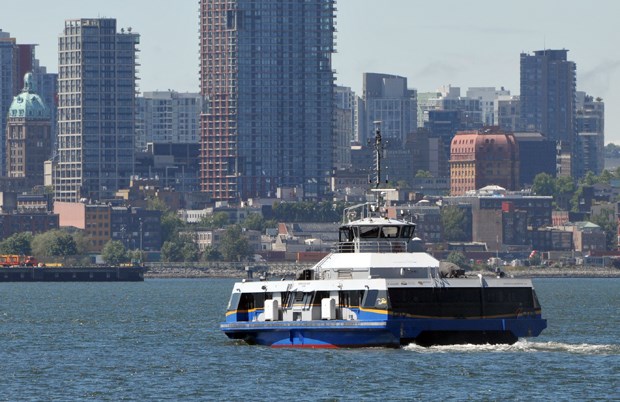Lower Mainland voters have rejected the plebiscite to fund TransLink improvements with a new sales tax.
The region-wide vote came back 61.68 per cent No to 38.32 per cent Yes, according to results released by Elections B.C. on Thursday. At stake was a .5 per cent sales tax that would fund $250 million per year in transportation improvements.
The majority of voters in all three North Shore municipalities voted No. City of North Vancouver voters came down 55.08 per cent against the tax. The District of North Vancouver’s No vote came in slightly higher at 55.39 per cent and the District of West Vancouver’s voters topped local opposition at 55.98 per cent.
The Mayors’ Council vision for transportation improvements on the North Shore included 50 per cent more SeaBus service, B-line buses linking Capilano University and Metrotown, Phibbs Exchange and Dundarave, and Lynn Valley with downtown Vancouver, as well as a 30 per cent increase in regular bus service.
The only other funding available to pay for those transit improvements is an increase in property taxes, and that option is not on the table, said City of North Vancouver Mayor Darrell Mussatto.
“If you were playing a game of crib, I would say that we just got skunked,” he said. “I have to point my finger, really quite clearly at the provincial government. It should never have gone to a plebiscite. However, here we are and we need to do something about public transportation in the region. There is no Plan B.”
West Vancouver Mayor Michael Smith, who was one of only three mayors to speak out against the plan, welcomed the result.
“They say in politics ‘Money talks’ but in this case, common sense talked even louder,” Smith said. “The public, I think, quite rightly saw there was little point in increasing taxes and putting money into an organization until you make sure it has the right business model for success, which is what I’ve been saying from Day 1.”
Though they have differing views on the outcome, both Mussatto and Smith agreed the Lower Mainland needs transportation improvements and that TransLink’s current governance model is dysfunctional.
“Referendums are not the way to fund essential services and we need to have a governance change in the TransLink model and decisions should not be made by two up-country MLAs,” Smith said. “Either Victoria takes the whole thing back and pays for it, or they turn it over to the region and say ‘You people plan it. You people operate it and you decide how to finance it.’”
But the province is not showing any sign that’s going to happen. Instead, Transportation and Infrastructure Minister Todd Stone suggested the hiring of a permanent customer-service focussed TransLink CEO and opening up TransLink board meetings to the public as methods to achieve more accountability.
“In the months ahead, we will give broader thought to other strategies and other measures that could potentially be taken to improve accountability and transparency at TransLink,” Stone said at a press conference on Thursday afternoon.
Stone stressed that the province has committed to funding one third of future TransLink improvements and said it’s the mayors’ responsibility to rethink their plan and how they will come up with the region’s share of the funding. One method at their disposal, Stone suggested, was increasing property taxes.
“Tomorrow, they could convene a meeting and decide to make some adjustments to property taxes that would cover certainly a substantial portion of it if not the entire gambit of the plan they just put in front of the people of the region,” he said.
The impacts of the No vote are going to be felt not just by transit riders, but by everyone as the region continues to grow, Mussatto said.
Mussatto said roads on the North Shore are already reaching their capacity in terms of their maximum ability to move traffic. “Without a co-ordinated public transportation system, we are going to see even worse impacts,” he said. “The City of North Vancouver will have to look at limiting how much growth we can accommodate. The problem is, they’re coming. They’re coming whether we work with them or not.”
Elections B.C. received 759,869 eligible ballots from a potential 1,562,386 registered voters — a 48.64 per cent turnout for the mail-in plebiscite. Another 38,393 ballots were considered ineligible.



